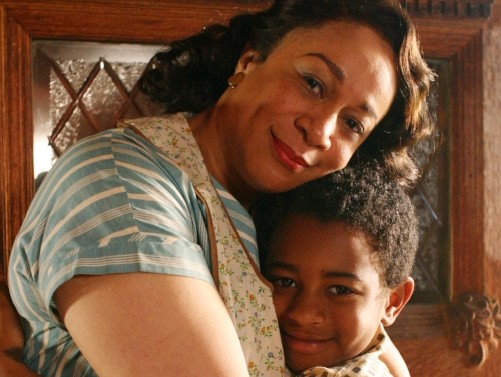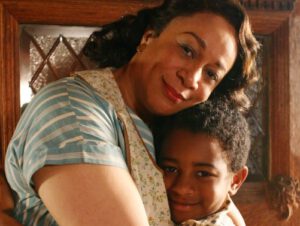Movie Info
Movie Info
- Director
- George C. Wolfe
- Run Time
- 1 hour and 35 minutes
- Rating
- PG-13
VP Content Ratings
- Violence
- 3/10
- Language
- 1/10
- Sex & Nudity
- 1/10
- Star Rating
Relevant Quotes
When he saw the crowds, he had compassion for them because they were harassed and helpless, like sheep without a shepherd.
I have owned the DVD of this film for several years and decided to watch it after watching George C. Wolfe’s marvelous Rustin. His 2018 film is not about a Civil Rights leader, but about an obscure woman who shepherded a group of misfits in her rooming house during the 1950s and early 60s. Wolfe’s first film, he developed it for HBO from an autobiographical one-act play by Ruben Santiago-Hudson which he directed in 2001. The story centers on the warm relationship between young Ruben Jr. (Marcus Carl Franklin) and Rachel Crosby (S. Epatha Merkerson), known to all as Nanny. The grown-up Ruben (Hill Harper) serves as the narrator.
Junior’s parents, Ruben Santiago (Jimmy Smits) and Alean (Carmen Ejogo), have separated and are unable to cope adequately with raising their son, especially with his mother’s mental problems. Nanny takes the 7-year old boy under her wing, and the boy soon gets to know the other residents, who find in Nanny’s home sanctuary from the cruel racism of the outside world.
Played by some wonderful actors that include Terrence Howard, Rosie Perez, Mos Def, Carmen Ejogo, Louis Gossett Jr., Jeffrey Wright, Ernie Hudson, Charlayne Woodward, Jimmy Smits, Patricia Wettig, Macy Gray, Liev Schreiber, Kathleen Chalfant, Lou Myers, the boarders are gamblers, a drug addict, an ex-convict, a one-armed handyman, a hairdresser, a Vietnam veteran, a singer and musician, and more. The playwright himself plays boarder Freddie Cobbs. (You might also have noticed that two of the actors are white—they are in just a brief scene in which a pair of social workers visit Ruben, posing a threat, but just for a moment. Otherwise, the white world is kept at a distance, forming the milieu of the Black community.)
All the actors in their own way contribute to young Ruben’s development, with his father Ruben Senior often being away looking for a job and his mother in mental facilities. As good as each of the actors are, S. Epatha Merkerson is outstanding as the fierce shepherd of her needy flock. In one tense scene she faces down an abusive husband, boldly daring him to strike her. He knows better, so he meekly backs down. To the boy Ruben Junior especially, she is as tender a shepherd as was Jesus. Probably the best advice given Ruben is from Nanny herself, when she tells the deeply disturbed boy that it’s alright to get upset, “but never hate. ”I have had to deal with that poison my whole life,” she says. One roomer describes Nanny as “like the government, if it really worked.”
The world outside Nanny’s home was dour and bleak, but inside there was much color and joy, the misfits forming a truly supportive community. Life at Nanny’s is rich, with parties, music, and dancing, as well as occasional cheating by the men, some spouse abuse, and a razor fight. Junior was even born during a Friday night fish fry. The roomers are poor economically but culturally rich. Although each character is allotted just a few words, they come alive, providing an American version of the African proverb, “It takes a whole village to raise a child.” The adult Ruben is well aware of his debt to Nanny and her flock.
The film ends on a nostalgic note with the adult Ruben walking through the city and observing all the empty and boarded up shops that he remembers were full of vibrant life when he was a child. Integration has come to the city, as well as a superhighway, bringing devastation to the Black-owned shops and establishments. The denizens no longer live in small supportive communities like Nanny Crosby once provided at her rooming house. Thus, the bittersweet conclusion reminds me of the ending of the Welsh film How Green Was My Valley when the protagonist, now grown up, returns to his coal-mining village to find that the green valley surrounding it is now filled up with ugly slag, his once-thriving village now just a memory.
Ruben sums up his past well: “The people of 32 Wasson Avenue wanted me to have more, amount to more than they did. And so they gave me that bit of themselves that they felt was their best. And the blues I heard and the stories they told will live inside of me forever.”
I remember living in Westfield NY in the 1980s and often, while driving to meetings in Buffalo, passing by the over two-mile-long inactive steel plant in Lackawanna. In the film some of Nanny’s boarders had worked there. A victim of sending manufacturing jobs overseas, no black smoke belched from its tall smokestacks. The vast plant was as dark and somber as the atmosphere outside Nanny’s home. I never realized then that I would one day be watching a film set in the town.
George C. Wolfe’s over-looked film deserves an appreciative audience and offers a view of social “progress” that might surprise a white audience. Director Wolfe has been quoted as declaring “Integration is the villain in this movie.” Now that should start an interesting discussion!
This review is in the January issue of VP along with a set of questions for reflection and/or discussion. If you have found reviews on this site helpful, please consider purchasing a subscription or individual issue in The Store.


